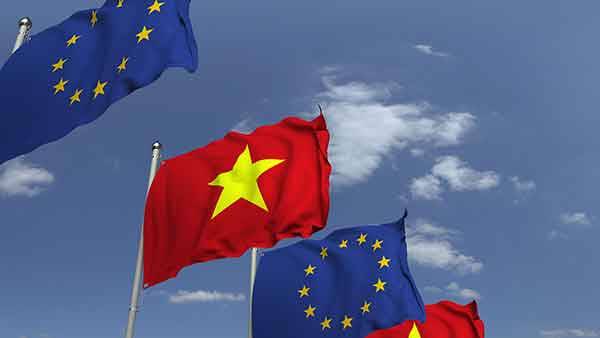The free trade agreement (EVFTA) signed in Hanoi on June 30, 2019 will come into force on August 1, 2020. The aim is to significantly simplify imports and exports in order to benefit from Vietnam’s strong economy. For Vietnam itself, this creates the opportunity to be more closely linked to European trade and to open up important markets. The new free trade agreement has thus created the basis for better economic relations in order to bring the EU and the Vietnamese region together economically.
A contribution through Vietnamese growth

One of the most important criteria is Vietnam’s economic strength. For free trade, around 65% of previous tariffs are therefore to be completely abolished, allowing the EU to export more to Vietnam. The remaining 35 percent of tariffs will be eliminated over the next ten years, including products such as wine, beef, and car parts.
The free trade agreement is also worthwhile on the other side. 71% of all import duties for Vietnamese goods will be eliminated immediately. After a further seven years, 99% of customs duties will have been abolished in order to strengthen the economy on both sides. This will lead to a significant strengthening of Vietnamese products in Europe, but also to a noticeable improvement in Vietnamese exports to the EU.
Ratification as confirmation of free trade
In order to lose as little time as possible for the agreement to enter into force, ratification took place immediately after the agreement was signed. As a result, the Vietnamese National Assembly has decreed that the free trade agreement known as the EVFTA can enter into force as early as early summer 2020. The specific date is now August 1, 2020, which means that mutual support in trade in goods will not be long in coming.
At this point, free trade between the EU and Vietnam is a sign of better international economic relations. Such cooperation aims to protect the rights of individual interest groups in both environments through the recognition of mutual standards. This also ensures greater comfort and fewer dangers for local workers in their everyday lives, so that they can organize their own work appropriately and fairly.
Special page: EVFTA Agreement
You can find out more about the free trade agreement between the EU and Vietnam, the so-called EVFTA, on our special pages on the agreement.
Conversions for import and export
A look at the specific content of the investment protection agreement shows that only proof of originating status
is required for exports from Vietnamese territory to Europe. This is a declaration by a registered exporter, whereby shipments with a value of up to EUR 6,000 are recognized. For imports, on the other hand, proof of preference is required, which is also equivalent to a declaration of origin.
Nevertheless, the new agreement has also been criticized. Vietnam’s political system in particular has been heavily criticized, as it is not a true democracy. Not all those responsible therefore see the participation of a region described as a single communist state in European trade as a step towards better relations. More important signals would be to guarantee access to clean drinking water, fresh air and medical care. However, despite its own problems, Vietnam did not fail to ratify the agreement.
Closer trade relations through the investment protection agreement
The free trade agreement should significantly improve relations with the Vietnamese economy. This can be seen even before the new agreements come into force, as bureaucracy and effort are to be eliminated as smoothly as possible through the investment protection agreement. For this reason, free trade is one of the EU’s flagship projects to promote global justice and also improve the economic situation.
Part of the ratification of the new free trade agreement is that the improvements in trade are also linked to an improvement in the social situation. This should be initiated as far as possible before entry into force in order to focus on improving the situation step by step. In this way, trade and change are combined so that the Vietnamese economy benefits from more exports and at the same time has access to European products and goods.


